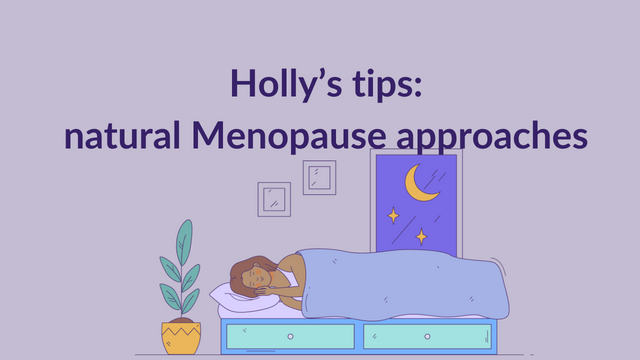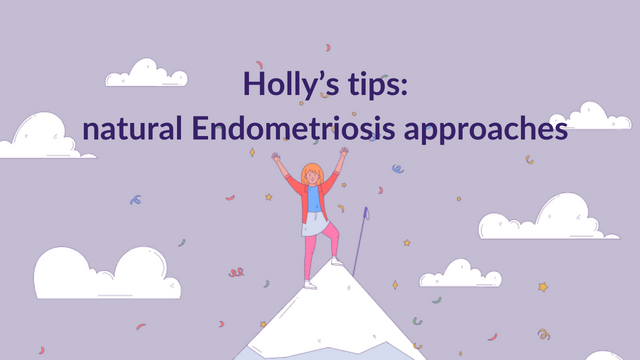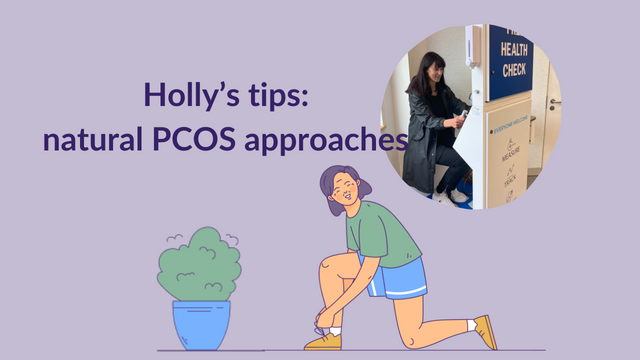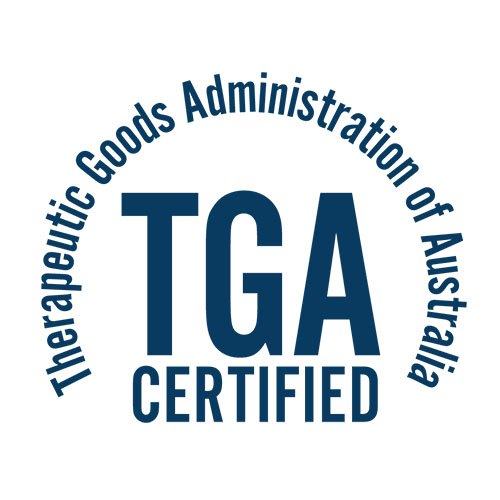Natural approaches for menopause
Holly Stone • 2024-02-10
As part of our series for International Women's Day 2024, we are empowering women with natural approaches to managing Menopause.
We now shift our focus to the often perplexing and less-discussed journey of menopause, an experience many of us confront without clear answers or even an understanding of what it is. Menopause, characterised by the cessation of periods due to declining hormone levels, typically affects women between 45 and 55, although it can occur earlier. This natural transition unfolds in three stages: perimenopause, menopause, and post-menopause. Menopausal symptoms impact 75% of women, carrying potential secondary consequences like osteoporosis and cardiovascular disease.
The first sign of perimenopause is usually, but not always, a change in the normal pattern of your periods. Symptoms can include changes in mood, brain fog, hot flushes, sleep disturbances, headaches to name just a few. Acknowledging the wide array of symptoms and their varying intensities during this significant life stage, we delve into some practical strategies to navigate this transformative journey.
Lifestyle Changes
- Weight-Bearing Exercises: Ensure you are incorporating lots of weight-bearing exercises into your routine to reduce the risk of osteoporosis. Activities like running are particularly effective for maintaining bone density and overall bone health which becomes crucial during and after menopause primarily due to the decline in oestrogen which drives the development of bone. A diet rich in calcium and vitamin D which enhances calcium absorption, will further contribute to the overall health of bones.
- Pelvic Floor Exercises: Engage in pelvic floor exercises for a period of 3 months to strengthen the muscles and prevent accidents associated with urinary incontinence. (https://www.nhs.uk/common-health-questions/lifestyle/what-are-pelvic-floor-exercises/)
- Stress Adaptation for Bladder Control: Consider stress adaptation techniques to regain control of your bladder, particularly if it has been compromised due to a lack of oestrogen. This approach is typically trialled for a period of 6 weeks. (https://www.swbh.nhs.uk/wp-content/uploads/2012/06/Bladder-retraining-ML3615.pdf)
- Minimise Alcohol, Caffeine and spicy foods Consumption as they can aggravate hot flushes.
Dietary Changes
Supporting Menopause with Nutrition:
- Phytoestrogens (plant oestrogens) closely resemble human oestrogen. Consuming them regularly and in sufficient quantities (30-40g per day), they can have mild oestrogen like effects. This becomes particularly important during menopause as the body adapts to lower oestrogen levels. An excellent source of phytoestrogens is flaxseeds, rich in lignans which contribute to these mild oestrogen-like effects. Including flaxseeds in the diet can be beneficial for supporting hormonal balance during this transformative stage.
- Healthy fats including omega 3 fatty acids as they reduce inflammation, and support brain health and cardiovascular function.
- Increase fibre intake to support healthy hormone metabolism. Foods high in fibre include oats, vegetables, fruit, whole grains, lentils, and nuts.
- A balanced diet is recommended where each meal contains ¼ protein, ¼ carbohydrate, and ½ fruits, vegetables, or salad. Avoiding trans fats and sugar intake as much as possible, and primarily incorporate plants (eat the rainbow), with small amounts of quality meats, fish, and poultry.
- Maintain stable blood sugar levels to help prevent hot flushes by avoiding the consumption of simple carbohydrates and sugars etc. which can lead to rapid spikes and subsequent drops in blood sugar. Opt instead for a balanced diet rich in complex carbohydrates and fibre, as fibre slows the release of glucose into the bloodstream, promoting better blood sugar control and minimising the risk of hot flushes.
- Limit salt intake to <6g per day, and avoid food rich in unsaturated fatty acids as can help mitigate risk factors for cardiovascular disease (e.g. hypertension or hypercholesterolaemia)
- Consume foods high in tryptophan as it facilitates the production of serotonin in the body which is a crucial neurotransmitter in regulating our mood. Foods high in tryptophan include turkey, oats, bananas, and chicken. Also worth pointing out that Vitamin B6 (tuna, salmon, eggs, spinach, sweet potatoes) facilitates the conversion of tryptophan into serotonin.
Important Nutrients
- Vitamin D: Check your vitamin D levels and supplement if needed. Vitamin D is an essential nutrient to support bone health, along with calcium, magnesium, and vitamin K.
- Calcium: Eating 2 to 3 portions of calcium-rich foods such as a third of a pint/200mL semi-skimmed/whole or goats' milk or a non-sweetened yoghurt such as Greek yoghurt. But remember certain vegetables such as spinach, kale and broccoli although contain less calcium overall, have a higher bioavailability than dairy which is just 30% (Harvard University).
- Seaweed: Women can experience an increase in blood pressure during and after menopause which is likely due to the reduced vasodilatory effect of oestrogen, which means that blood vessels may not relax as effectively, causing an increase in blood pressure. Seaweed, abundant in magnesium, aids in lowering blood pressure by preventing blood vessel constriction, as well as a powerhouse superfood containing a highly concentrated source of nutrients, source of omega-3 fats and a range of amino acids, so it could be a great addition to your diet in moderation. Including further magnesium-rich foods like green leafy vegetables and almonds further supports heart health which is crucial for women of menopausal age as this natural transition significantly impacts cardiovascular health.
- Other dietary additions can be beneficial in reducing blood pressure, including turmeric which is cardio-protective and Garlic due to the allicin it contains. Celery juice also is very high in potassium and can lessen the effect of sodium.
Herbal remedies
Herbs such as sage (e.g. sage in tea or cooking) black Cohosh, red clover, and wild yam have had some positive effects on some women in balancing hormone levels and in some cases been effective against the symptoms of menopause. You can consult with an herbalist who can tailor a blend specific to an individual’s needs and symptoms. However, these are not specifically recommended by the NHS due to the lack of scientific evidence and as these medications may interact with other medications that you may be on please note it would be important to consult first with a GP who can advise further.
Additional Tips
- Wear loose-fitting clothes to keep your body cool during hot flashes and night sweats.
- Women who suffer from vaginal dryness can consider over-the-counter measures such as vaginal lubricants or moisturisers. These can also be used if dyspareunia (painful sex) is experienced.
- Cognitive behavioural therapy has shown to be extremely effective against the mood swings often seen with menopause, as well as insomnia. CBT has been shown to be more effective than medical measures and provide long-lasting relief of mood fluctuations associated with menopause. It may require commitment and effort, but most importantly, it avoids the harmful side effects that medications carry. CBT is accessible through self-help books, internet-based CBT, or mobile phone applications (e.g. Mindshift/CBT companion). Interestingly, in a 2023 study by the British Medical Journal (BMJ), CBT has also been shown to be useful in managing hot flashes.
Summary
During our exploration of empowering women through natural approaches for the menopausal transition, we've touched on a spectrum of strategies. From the importance of weight-bearing exercises to safeguard against osteoporosis to the benefits of incorporating phytoestrogens.
Now looking across the various menstrual health conditions we have discussed, from PMS to PCOS, endometriosis, and menopause we see how a unified approach emerges in managing the symptoms more effectively and the key lies in recognising the interconnected nature of our endocrine system (A system which is made up of glands that make hormones). It’s important to highlight once again that our health is not solely defined by what we eat but also by how effectively we support the body in eliminating toxins and excess hormones through improving gut health and dietary choices. As we conclude this series for International Women's Day, the combination of stress management, blood glucose control, anti-inflammatory diets, and detoxification support form a holistic foundation for navigating the complexities of menstrual health conditions and maintaining hormonal balance. By understanding and applying these principles, we empower women to embrace resilience in their journey towards better management of symptoms.
Finally, It's important to note that all these approaches will play a part in supporting and improving symptoms associated with this condition but they do not substitute for professional medical advice.
Resources
https://www.nhs.uk/common-health-questions/lifestyle/what-are-pelvic-floor-exercises/
https://www.bmj.com/content/383/bmj.p2711.full
https://www.naturopathy-uk.com/
https://www.mymenopausecentre.com
https://www.nhs.uk/conditions/menopause/symptoms/
https://www.swbh.nhs.uk/wp-content/uploads/2012/06/Bladder-retraining-ML3615.pdf
See More Posts
SiSU Health UK
Copyright © 2023 SiSU Health Group.
All rights reserved.






